原因状语地点状语从句20例句
- 格式:doc
- 大小:18.50 KB
- 文档页数:3
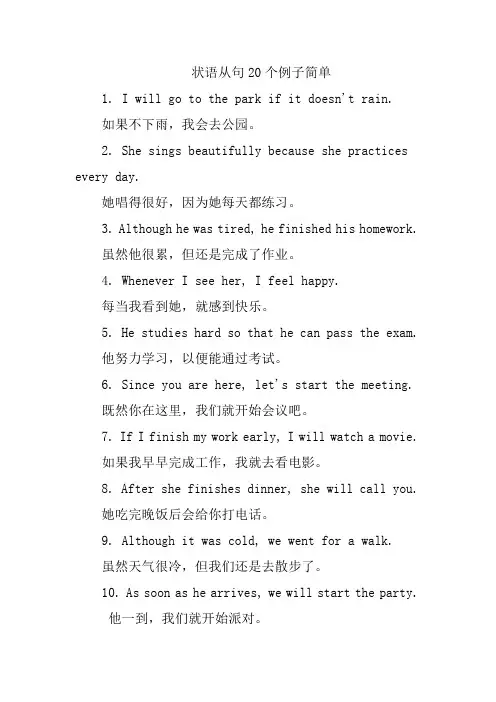
状语从句20个例子简单1. I will go to the park if it doesn't rain.如果不下雨,我会去公园。
2. She sings beautifully because she practices every day.她唱得很好,因为她每天都练习。
3. Although he was tired, he finished his homework.虽然他很累,但还是完成了作业。
4. Whenever I see her, I feel happy.每当我看到她,就感到快乐。
5. He studies hard so that he can pass the exam.他努力学习,以便能通过考试。
6. Since you are here, let's start the meeting.既然你在这里,我们就开始会议吧。
7. If I finish my work early, I will watch a movie.如果我早早完成工作,我就去看电影。
8. After she finishes dinner, she will call you.她吃完晚饭后会给你打电话。
9. Although it was cold, we went for a walk.虽然天气很冷,但我们还是去散步了。
10. As soon as he arrives, we will start the party.他一到,我们就开始派对。
11. Whenever it snows, the children go outside to play.每当下雪,孩子们就会出去玩。
12. Because she was late, she missed the bus.因为她迟到了,所以错过了公交车。
13. Though he is young, he is very wise.虽然他年轻,但很聪明。
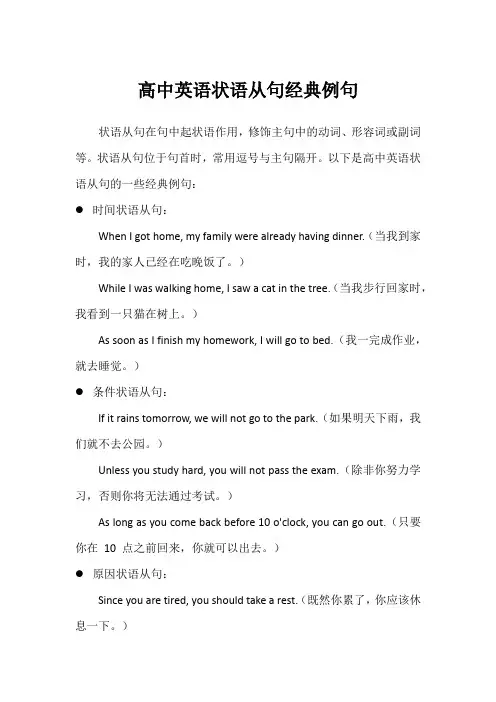
高中英语状语从句经典例句状语从句在句中起状语作用,修饰主句中的动词、形容词或副词等。
状语从句位于句首时,常用逗号与主句隔开。
以下是高中英语状语从句的一些经典例句:●时间状语从句:When I got home, my family were already having dinner.(当我到家时,我的家人已经在吃晚饭了。
)While I was walking home, I saw a cat in the tree.(当我步行回家时,我看到一只猫在树上。
)As soon as I finish my homework, I will go to bed.(我一完成作业,就去睡觉。
)●条件状语从句:If it rains tomorrow, we will not go to the park.(如果明天下雨,我们就不去公园。
)Unless you study hard, you will not pass the exam.(除非你努力学习,否则你将无法通过考试。
)As long as you come back before 10 o'clock, you can go out.(只要你在10 点之前回来,你就可以出去。
)●原因状语从句:Since you are tired, you should take a rest.(既然你累了,你应该休息一下。
)Because he was ill, he didn't go to school yesterday.(因为他病了,所以昨天他没有去上学。
)As the weather is so hot, we decide to go swimming.(由于天气太热,我们决定去游泳。
)●目的状语从句:In order that he can pass the exam, he studies very hard.(为了能通过考试,他学习非常努力。
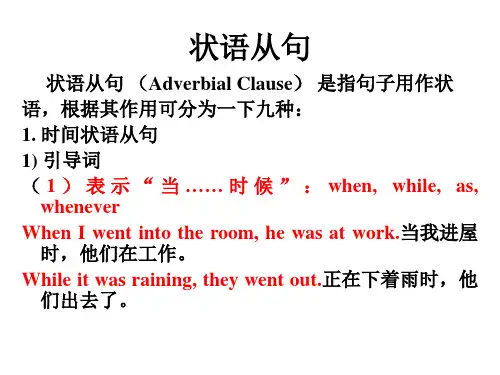
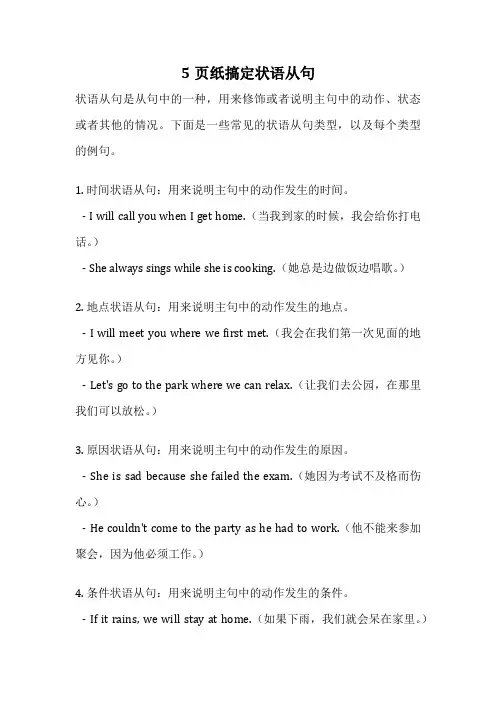
5页纸搞定状语从句状语从句是从句中的一种,用来修饰或者说明主句中的动作、状态或者其他的情况。
下面是一些常见的状语从句类型,以及每个类型的例句。
1. 时间状语从句:用来说明主句中的动作发生的时间。
- I will call you when I get home.(当我到家的时候,我会给你打电话。
)- She always sings while she is cooking.(她总是边做饭边唱歌。
)2. 地点状语从句:用来说明主句中的动作发生的地点。
- I will meet you where we first met.(我会在我们第一次见面的地方见你。
)- Let's go to the park where we can relax.(让我们去公园,在那里我们可以放松。
)3. 原因状语从句:用来说明主句中的动作发生的原因。
- She is sad because she failed the exam.(她因为考试不及格而伤心。
)- He couldn't come to the party as he had to work.(他不能来参加聚会,因为他必须工作。
)4. 条件状语从句:用来说明主句中的动作发生的条件。
- If it rains, we will stay at home.(如果下雨,我们就会呆在家里。
)- I will go to the concert with you as long as I can get a ticket.(只要我能买到票,我就会和你一起去听音乐会。
)5. 结果状语从句:用来说明主句中的动作的结果。
- She studied hard, so she got good grades.(她努力学习,所以取得了好成绩。
)- The weather was bad, therefore, the game was canceled.(天气不好,因此比赛被取消了。
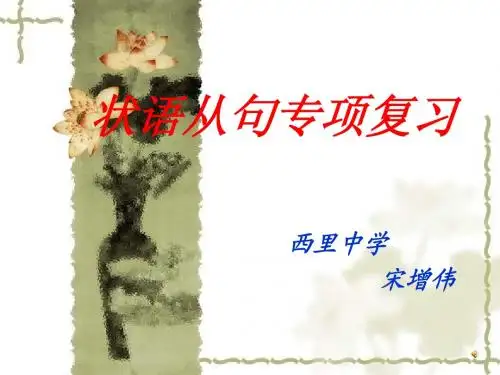

1. He distrusted me because I was new.他不信任我因为我是新来的。
2. As all the seats were full he stood up.由于所有的座位都满了,他只好站着。
3. The country is not strong because it is large.国强不在大。
4. The sweater shrank because it was washed badly. 这件毛衣缩水了,因为洗的太糟糕了。
5. Since /As we’ve no money, we can’t buy it.由于我们没钱,我们买不起它。
6. He could not have seen me, for I was not there.他不可能见过我,因为我不在那儿。
7. Since you’re not interested, I won’t tell you about it. 既然你不感兴趣,那我就不告诉你了。
8. I do it because I like it.我做这件事是因为我喜欢。
9. Now that you are well again, you can travel.既然你已恢复了健康,你可以去旅行了。
10. As it was raining, I stayed at home.由于下雨,我便呆在家里。
1. Where I live there are plenty of trees.我住的地方树很多。
2. Wherever I am I will be thinking of you.不管我在哪里我都会想到你。
3. We must camp where we can get water.我们必须在能找到水的地方露营。
4. Go back where you came from.你从何处来到何处去。
5. They will go where they are happy.他们想到他们觉得快乐的地方去。
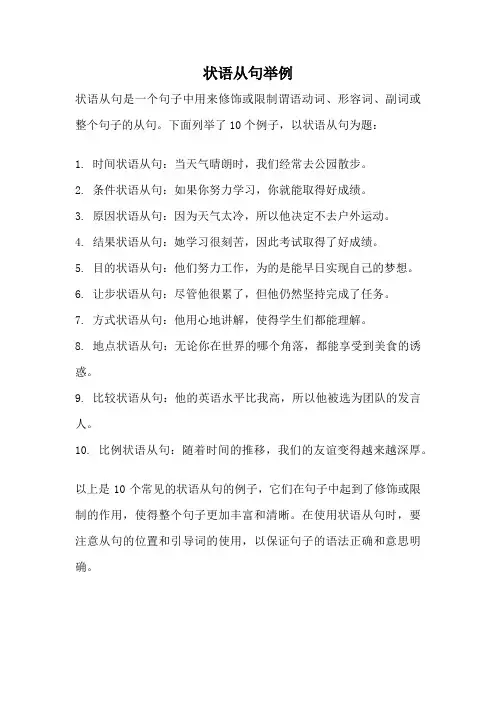
状语从句举例
状语从句是一个句子中用来修饰或限制谓语动词、形容词、副词或整个句子的从句。
下面列举了10个例子,以状语从句为题:
1. 时间状语从句:当天气晴朗时,我们经常去公园散步。
2. 条件状语从句:如果你努力学习,你就能取得好成绩。
3. 原因状语从句:因为天气太冷,所以他决定不去户外运动。
4. 结果状语从句:她学习很刻苦,因此考试取得了好成绩。
5. 目的状语从句:他们努力工作,为的是能早日实现自己的梦想。
6. 让步状语从句:尽管他很累了,但他仍然坚持完成了任务。
7. 方式状语从句:他用心地讲解,使得学生们都能理解。
8. 地点状语从句:无论你在世界的哪个角落,都能享受到美食的诱惑。
9. 比较状语从句:他的英语水平比我高,所以他被选为团队的发言人。
10. 比例状语从句:随着时间的推移,我们的友谊变得越来越深厚。
以上是10个常见的状语从句的例子,它们在句子中起到了修饰或限制的作用,使得整个句子更加丰富和清晰。
在使用状语从句时,要注意从句的位置和引导词的使用,以保证句子的语法正确和意思明确。
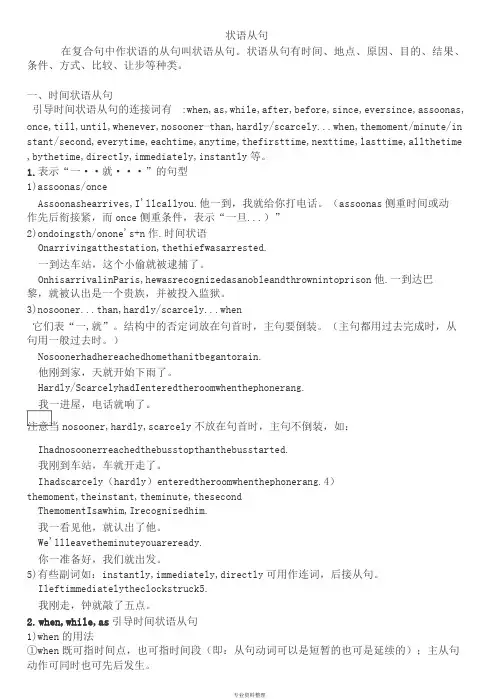
状语从句在复合句中作状语的从句叫状语从句。
状语从句有时间、地点、原因、目的、结果、条件、方式、比较、让步等种类。
一、时间状语从句引导时间状语从句的连接词有:when,as,while,after,before,since,eversince,assoonas, once,till,until,whenever,nosooner⋯than,hardly/scarcely...when,themoment/minute/in stant/second,everytime,eachtime,anytime,thefirsttime,nexttime,lasttime,allthetime ,bythetime,directly,immediately,instantly等。
1.表示“一··就···”的句型1)assoonas/onceAssoonashearrives,I'llcallyou.他一到,我就给你打电话。
(assoonas侧重时间或动作先后衔接紧,而once侧重条件,表示“一旦...)”2)ondoingsth/onone's+n作.时间状语Onarrivingatthestation,thethiefwasarrested.一到达车站,这个小偷就被逮捕了。
OnhisarrivalinParis,hewasrecognizedasanobleandthrownintoprison他.一到达巴黎,就被认出是一个贵族,并被投入监狱。
3)nosooner...than,hardly/scarcely...when它们表“一,就”。
结构中的否定词放在句首时,主句要倒装。
(主句都用过去完成时,从句用一般过去时。
)Nosoonerhadhereachedhomethanitbegantorain.他刚到家,天就开始下雨了。
Hardly/ScarcelyhadIenteredtheroomwhenthephonerang.我一进屋,电话就响了。

高中状语从句语法及例句高中状语从句语法及例句状语从句状语从句在高考试题中加上其它从句的干扰,以及倒装句,强调句的介入,使得状语从句更为复杂。
状语从句是一种副词性从句,通常由一个从属连词或一个起连词作用的词组引导。
1.时间状语从句由下列连词引导:when, while , as, before, after, once, till, until, once, as soon as, now that, hardly…when, scarcely…when, no sooner…than,有一些表示时间的副词(短语)或名词短语也可引导时间状语从句。
如:directly, instantly, immediately, by the time,the moment, the second, the minute, the instant, every time, each time, next time, the last time等注意点如下:1)when, while, as引导的时间状语从句as表示“当……的时候”,往往和when/ while通用,但它着重强调主句与从句的动作或事情同时或几乎同时发生。
①She came up as I was cooking.(同时)②When I was walking down the street, I came across an old friend of mine.我在街上行走时,碰到一位老朋友when(at or during the time that )既可以表示在某一点的时候,又可表示在某一段时间内,主句与从句的动作或事情可以同时发生也可以先后发生。
①It was raining when we arrived.(指时间点)②When we were at school, we went to the library every day.(在一段时间内)③When we arrived there, the film had already begun.(先后发生)While强调一段时间里,仅表示从句和主句的动作同时发生,并且有延续意义,该从句中的动词一般要用延续性动词,从句中常用过去进行时态或一般过去时态;在when表示a period of time 时,两者可以互换。
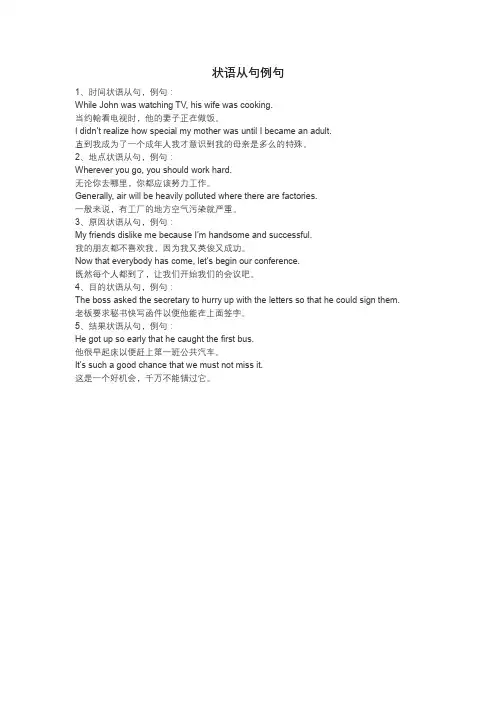
状语从句例句1、时间状语从句,例句:While John was watching TV, his wife was cooking.当约翰看电视时,他的妻子正在做饭。
I didn’t realize how special my mother was until I became an adult.直到我成为了一个成年人我才意识到我的母亲是多么的特殊。
2、地点状语从句,例句:Wherever you go, you should work hard.无论你去哪里,你都应该努力工作。
Generally, air will be heavily polluted where there are factories.一般来说,有工厂的地方空气污染就严重。
3、原因状语从句,例句:My friends dislike me because I’m handsome and successful.我的朋友都不喜欢我,因为我又英俊又成功。
Now that everybody has come, let’s begin our conference.既然每个人都到了,让我们开始我们的会议吧。
4、目的状语从句,例句:The boss asked the secretary to hurry up with the letters so that he could sign them.老板要求秘书快写函件以便他能在上面签字。
5、结果状语从句,例句:He got up so early that he caught the first bus.他很早起床以便赶上第一班公共汽车。
It’s such a good chance that we must not miss it.这是一个好机会,千万不能错过它。

英语状语举例英语中经常用状语来修饰动词、形容词、副词和整个句子,表示时间、地点、原因、方式等等。
在写作和口语表达中,运用状语可以使语言更加丰富准确、精彩生动。
以下是英语状语的一些举例。
一、时间状语1. Yesterday, I went to the cinema and watched a new movie.2. Last summer, she traveled around Europe.3. During the break, I had a cup of coffee.二、地点状语1. I often swim in the pool.2. The meeting will be held in the conference room.3. We will go camping in the mountains.三、方式状语1. He speaks English fluently.2. They danced happily in the party.3. She read the book carefully.四、原因状语1. Because of the rainy weather, I stayed at home.2. Due to the traffic jam, he was late for the appointment.3. Thanks to her help, I made great progress in my study.五、结果状语1. The storm was so strong that many trees fell down.2. The cake was so delicious that I had two more pieces.3. He studied hard, so he passed the exam.六、方式状语1. He ran to the station to catch the train.2. She drove the car slowly on the highway.3. They played basketball enthusiastically.七、条件状语1. If it rains tomorrow, we will stay at home.2. Unless she finishes her work, she cannot go out.3. Provided that you come early, we can go to the concert together.八、让步状语1. Although it was raining heavily, they still went for a picnic.2. Despite the cold weather, she wore a dress to the party.3. In spite of the difficulty, he managed to finish the task on time.总之,掌握英语状语的用法和举例对于提高英语表达能力非常有帮助。
状语从句:1.时间状语:A.当我进屋时,他正在写信。
He was writing letter when I came in.B.我们什么时间有空,我们就去那里。
We will go there when we have free time.C.天下雨的时候,他们出去了。
As it begun to rain, they went out.D.他不在的时候我在。
I’m here when he isn’t here.E.比赛开始后,他到了。
After the game had begun, he arrived.F.我们一直等到他回来。
We were waiting until he came back.G.她到11点才停止工作。
She didn’t stop working until 11 o’clock.H.我刚一到家就下雨了。
The moment I arrived at home, it began to rain.I.我们刚到火车站,火车就走了。
Hardly had we arrived at the station, when the train left. J.我们刚开始就被叫停。
No sooner we had begun, then we were stopped.K.我每次乘船就晕船。
Every times I take ship, I will get seasick.L.我一听到这首歌,就感到很愉快。
The moment I hear this song, I feel happy.M.下次你来的时候,就会见到他。
Next time you come back, you see her.2.地点状语:a.有志者,事竟成。
Where there is a will, there is a way.b.哪里有水,哪里就有生命。
Where there is water, there is life.c.无论你去哪里都要遵守法律。
状语从句【用法讲解】考试要求:状语从句概念:用一个句子(从句)来作另一个句子(主句)的状语,用作状语的句子就叫作状语从句。
作什么样的状语就叫什么类型的状语从句。
引导状语从句的连接词是从属连词,状语从句可以在句首,也可以在句尾。
中考主要考查状语从句的类型有:时间状语从句、地点状语从句、原因状语从句、结果状语从句、目的状语从句、条件状语从句及比较状语从句等。
1. 时间状语从句:时间状语从句在主句中表示时间,常用连接词有:when(当……时),while(当……时),as(当……时),before(在……之前),after(在……之后),since(自从),not…until(直到……才), as soon as(一……就),once(一旦……就)等。
例如:I didn’t go to bed until I finished my homework. 我直到做完作业才去睡觉。
I can listen to the radio while I work. 我可以边听收音机边工作。
(1) 时间状语从句中,一般要用一般现在时代替一般将来时,一般过去时代替过去将来时。
例如:I will telephone you when he comes. 他来时,我会给你打电话。
I’ll stay here until you come back. 我会呆在这里,直到你回来。
(2) when引导时间状语从句,表示主句的动作和从句的动作同时或先后发生,从句的谓语可以是延续性动词,也可以是瞬间动词。
例如:He was working when I went in. 我进去时他正在工作。
When she heard the news, she began to cry. 她听到这个消息,她哭了起来。
(3) while引导的状语从句中常用延续性动词或表示状态的动词,意思是“在……期间”。
while还可以表示两者之间的对比关系。
状语从句在复合句中作状语的从句叫状语从句。
状语从句有时间、地点、原因、目的、结果、条件、方式、比较、让步等种类。
一、时间状语从句引导时间状语从句的连接词有: when, as, while, after, before, since, ever since, as soon as, once, till, until, whenever, no sooner…than, hardly/scarcely...when, themoment/minute/instant/second, every time, each time, any time, the first time, next time, last time, all the time, by the time, directly, immediately, instantly等。
1.表示“一···就···”的句型1) as soon as/onceAs soon as he arrives, I'll call you.他一到,我就给你打电话。
(as soon as 侧重时间或动作先后衔接紧,而once侧重条件,表示“一旦...”)2) on doing sth/on one's + n.作时间状语On arriving at the station, the thief was arrested.一到达车站,这个小偷就被逮捕了。
On his arrival in Paris, he was recognized as a noble and thrown into prison. 他一到达巴黎,就被认出是一个贵族,并被投入监狱。
3) no sooner ...than , hardly/scarcely...when它们表“一…就”。
结构中的否定词放在句首时,主句要倒装。
英语中状语从句用法及例句总结(完整)状语从句(Adverbial Clause)状语从句指句子用作状语时,起副词作用的句子。
它可以修饰谓语、非谓语动词、定语、状语或整个句子。
根据其作用可分为时间、地点、原因、条件、目的、结果、让步、方式和比较等从句。
状语从句一般由连词(从属连词)引导,也可以由词组引起。
从句位于句首或句中时通常用逗号与主句隔开,位于句尾时可以不用逗号隔开。
状语从句的种类状语从句可分为:1.时间状语从句;(adverbial clause of time)2.地点状语从句;(adverbial clause of place)3.原因状语从句;(adverbial clause of cause)4.条件状语从句;(adverbial clause of condition)5.目的状语从句;(adverbial clause of purpose)6.让步状语从句;(adverbial clause of concession)7.比较状语从句;(adverbial clause of comparison)8.方式状语从句;(adverbial clause of manner)9.结果状语从句。
(adverbial clause of result)[编辑本段]状语从句的时态特点一般情况下,时间和条件状语从句的谓语动词一般用“一般现在时”表示“一般将来时”,用“现在完成时”表示“将来完成时”。
例如:I will call you as soon as I arrive in Beijing. 我一到北京就给你打电话。
(这是由as soon as引导的时间状语从句,从句中的谓语动词arrive是一般现在时,表示一般将来时,决不可用will arrive)As soon as I have finished this work, I will go home. 我一完成此工作,就回家。
状语从句例子状语从句是指一句话中,修饰主句的从句。
它可以在句子中充当状语,表示时间、地点、原因、条件等。
翻译成中文后,常常放在主句前面。
一、时间状语从句时间状语从句用来表示一个动作或事情发生的时间。
例如:When I left home this morning, it was raining.(当我今天早上离开家的时候下雨了。
)在这个句子中,“when”是时间状语从句的引导词,修饰主句中的“it was raining”。
二、地点状语从句地点状语从句用来表示一个动作或事情发生的地点。
例如:Wherever you go, there you are.(你走到哪里,你就在哪里。
)在这个句子中,“wherever”是地点状语从句的引导词,修饰主句中的“there”。
三、原因状语从句原因状语从句用来表示一个动作或事情发生的原因。
例如:Since I'm feeling better, I think I'll go for a walk.(因为我感觉好多了,所以我想去散步。
)在这个句子中,“since”是原因状语从句的引导词,修饰主句中的“I think I'll go for a walk”。
四、条件状语从句条件状语从句用来表示一个动作或事情发生的条件。
例如:If I had more money, I would travel more.(如果我有更多的钱,我会旅行得更多。
)在这个句子中,“if”是条件状语从句的引导词,修饰主句中的“I would travel more”。
总之,状语从句是英语中非常重要的语法结构之一,掌握好它的用法对于提高英语水平有着非常大的帮助。
在学习的过程中,可以通过大量阅读和练习来掌握状语从句的用法,并在写作时适当运用。
状语从句例句英语1. 时间状语从句(Adverbial Clause of Time)- When she arrived, the party had already started.- Before you go to bed, make sure all the lights are turned off.2. 原因状语从句(Adverbial Clause of Cause)- Because it was raining, we decided to stay at home.- Since you are already late, you might as well take your time.3. 条件状语从句(Adverbial Clause of Condition)- If it rains tomorrow, we will cancel the trip.- Unless you study harder, you won't pass the exam.4. 结果状语从句(Adverbial Clause of Result)- So loudly did he shout that everyone heard him.- She was so tired that she fell asleep immediately.5. 目的状语从句(Adverbial Clause of Purpose)- In order to improve his skills, he practiced every day.- He saved money so that he could buy a new car.6. 让步状语从句(Adverbial Clause of Concession)- Although it was cold, he went swimming.- While I understand your point, I don't agree with you.7. 方式状语从句(Adverbial Clause of Manner)- As if nothing had happened, she continued her work. - He sings as if he were a professional singer.8. 地点状语从句(Adverbial Clause of Place)- Wherever you go, I will follow you.- Everywhere they looked, there were signs of destruction.。
1. He distrusted me because I was new.
他不信任我因为我是新来的。
2. As all the seats were full he stood up.
由于所有的座位都满了,他只好站着。
3. The country is not strong because it is large. 国强不在大。
4. The sweater shrank because it was washed badly. 这件毛衣缩水了,因为洗的太糟糕了。
5. Since /As we’ve no money, we can’t buy it.
由于我们没钱,我们买不起它。
6.
He could not have seen me, for I was not there.
他不可能见过我,因为我不在那儿。
7. Since you’re not interested, I won’t tell you about it.既然你不感兴趣,那我就不告诉你了。
8. I do it because I like it.
我做这件事是因为我喜欢。
9. Now that you are well again, you can travel.
既然你已恢复了健康,你可以去旅行了。
10. As it was raining, I stayed at home.
由于下雨,我便呆在家里。
1. Where I live there are plenty of trees.
我住的地方树很多。
2. Wherever I am I will be thinking of you.
不管我在哪里我都会想到你。
3. We must camp where we can get water.
我们必须在能找到水的地方露营。
4. Go back where you came from.
你从何处来到何处去。
5. They will go where they are happy.
他们想到他们觉得快乐的地方去。
6. You should have put the book where you found it.
你本来应该把书放回原来的地方。
7. Where the sea is, you will find seamen.
有海就有海员。
8. Sit wherever you like.
请随便坐。
9. Where there is no rain, farming is difficult or impossible.在没有雨水的地方,耕作是困难的,或根本不可能的。
10. Where the Communist Party of China goes, there the people are liberated.
哪里有了中国共产党,哪里人民得解放。
友情提示:本资料代表个人观点,如有帮助请下载,谢谢您的浏览!。